
Sensitive and at the same time ruthless portrayal of child abuse and its traumatizing effect
"Miss Baek" is a KMovie about child abuse. Sensitively, cautiously and at the same time ruthlessly, it portrays the example of two 'victims' - a young girl and a grown up woman (actually also a man). It shows how the system prefers to helplessly look the other way, leaving the children alone in their family hell. It also illustrates how this traumatization affects their future lives, remaining trapped in their frightening dark history, still vividly present for the rest of their lifes.Han Si-mi has received multiple awards for her performance as Miss Baek. But also Kim Si-a in the role of little Ji-eun is just incredible. And the rest of the cast and production, too. Also thank you for the consistently tranquil, unexcited simplicity as well as a to the point, no-frills narration.
Highly valuable. By the way, the story is based on a true event.
------------------------- SIDE NOTE: --- Child abuse in South Korea ---
The cane in schools has been officially banned in South Korea since 2010. However, thrashing at home is another issue. Among the cases of child abuse confirmed by the police, more than 80 percent can be traced back to the biological parents as the perpetrators. To this, add the dark figure. Accurate statistics on the prevalence and frequency of violence against children are difficult to obtain, since the police, ministries, child protection centres, independent agencies, etc. each compile their own statistics, which are based on estimated numbers.
Many South Korean parents grew up like that themselves ... and still belief that children are the extended selves of the parents, kind of - not individual separate beings. Social focus is not on the rights of the children, but more so on those of the parents. Upbringing is primarily the private affair of parents and not a matter of legal jurisdiction. In this context there is often talk of the "stick of love". In fact, many parents believe that thrashing strengthens their children's character while showing them how much they are loved.
In many European countries this no less than abuse. And fortunately there is a growing awareness of this in South Korea as well. In media representation again and again one encounters scenes of child abuse, e.g. in KDrama and KMovie. It is common. However, fortunately, it starts to be more and more common, too, that this kind of violence is being socially confronted as part of the storytelling... Statstically, the number of cases with serious domestic abuse being investigated by the police is increasing. Including cases in which parents abuse their children to death. This does not imply that child abuse is increasing, rather that more cases are being reported. An encouraging sign. It gives hope that the dominance of traditional (and often abusing) parenting concepts is slowly crumbling.
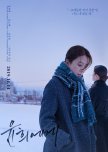
It is about Sisterhood - with a deep connection transcending age and nation. Yet in a man´s world.
When watching KMovies, one stumbles across productions that are surprisingly quiet and told with comparatively few words. "Moonlit Winter" is one of them. A quiet road movie of a mother an her daughter enriched with pictorial symbols and allegories. Like a long cold winter night.It's about the unhappy love between two young girls that wasn't allowed to be. (SIDE NOTE: To this day, homosexual love is socially outlawed in South Korea. Starting with the younger generation, a little more tolerance is creeping into society, but only at a snail's pace they are starting to find something like solid ground under their feet.)
It is about the (need for) reconciliation with the past. About shame, guilt and forgiveness. And about choosing yourself first. Self love. And then, strengthened in that, one can choose anything, including a relationship... even if it's a homosexual one that still is socially undesirable...
Intense! The list of awards is correspondingly long. However: The intensity could easily be missed, because the quiet, long winter nights are what they are: Long. Dark. Cold. If you don't discover the magic of the diffuse moonlight for yourself, then time can get pretty dreary and gloomy.
The cast fits the show. They are all radiating and keeping the intensity in minimalistic terms.
It is about women with a deep connection transcending age and nation. About Sisterhood!
Tender. True. Yet in a man´s world.
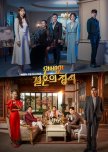
Another Cinderella, all-out, taking her sudden chance for revenge
"Perfect Marriage Revenge" is based on a webtoon and tells the story of a second chance in life, set in the top percentile of society. Another Cinderella story. And as is the case with fairy tales, you can hear them over and over again...This version is particularly enjoyable, being peppered with gratifying moments of retribution. Cinderella wants to get one over on the mean stepmother and her nasty daughter! She doesn't want to be nice and well behaved anymore. Splendid! Of course the others obviously attempt to push back on her new self. This ultimately leads to a lively exchange of blows between two of the country's rich business families.
"Perfect Marriage Revenge" delivers intrigue and makjang, cleverly mixed with emotional complications and well-placed retaliation, which is, however, repeatedly and tirelessly parried. It´s like ping-pong - reckoning here, malice there, self-respect here, nefariousness there. What a delight, if you´re in the mood for just that.
A campaign of revenge with an open visor. With an explicit protagonist who allows herself to act impulsively, intuitively and cleverly at the same time. In her authenticity, she is able to win the hearts of allies as she is fighting her battle not out of greed, but out of self-love for her self-respect.
As I said, with plenty of gratifying moments...
And as a fairy tale it surely delivers...
No more, no less.
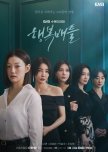
Despite all the catfights there is a deeper grounding to the story. Intelligent. Emotional. Opaque.
"Battle for Happiness" is based on a novel, the author herself having written the script for its KDrama version on PayTV, too. The story offers refreshing substance - with insight into honest emotional worlds underneath a shimmering dishonest surface. Powerful, intense women, who also have their sore, hidden wounds, shaping a surprisingly powerful story. Hats off!The story is set in the elite world of elite Gangnam mothers in the elite (fictional) Gangnam housing block Herinity. But even though the ladies may have made it into the upper league of society by marrying a lawyer or doctor or having wealth in some other way, they are still far from happy - even if they do almost everything to make it look as if...
Perhaps one could say that the KDrama is (again) a reckoning with the dubious concept that gives preference to the radiant, shimmering external appearance over truthful, sincere substance. But that's quite abstract. Actually, “Battle for Happiness” is rather precise. The battles are taking place in the mud of the protagonists' hidden secrets and weaknesses. That is dirty. That is mean. That is malicious. That is cruel. But that's what the life of those Gangnam mothers is all about. The societal backdrop is characterized by the overall social pressure to perform and compete for pole position in the race for the top spots in the social pyramid. But this is actually just the backdrop. It's actually less about the children. They are ornaments of their mothers. The mothers, on the other hand, are in the spotlight - wealthy, frighteningly powerful, influential women. Vulnerable people, nonetheless.
Admittedly, at the beginning I was tempted drop – those bitches! So false, so dishonest, so calculating, it was almost unbearable... The social media in their function, to spice up one´s own life a little more gloriously on the outside, are elaborately integrated into the overall dramaturgical structure. However, I stuck with “Battle for Happiness” because despite all the catfights there is a deeper grounding to the story, whose charisma can eventually fully unfold.
In fact, I'm glad I stuck with it, because the story offers an exciting rollercoaster ride of assumptions and suspicions. "Battle of Happiness" suddenly turns out to be a captivating crime thriller in which an inconspicuous private person takes the investigation into her own (unexperienced and sometimes naïve, impulsive) hands. Yet, even more appealing to me is the naturalness in which this KDrama gives a hand for compassion - even with the worst of the she-devils: the lady, who as the incarnated princess of hell in designer clothes initially got people´s minds running wild...
It´s the ladies, who rock the show. They are mothers, wives or single. In any case, you can't get past them. And they, for their part, cannot avoid facing their own sore wounds, which are catching up with them one by one. We consistently dig deeper into the hidden emotional worlds of those women (plus also a couple of men and some children). They must face their personal emotional battles, even if they don´t want to. In the best case scenario, they become their actual battles for happiness, as they lead to their very personal questions and truths - what is REALLY crucial in my life?
There is a dubious mathematical equation circulating among those ladies that goes something like this: 'The amount of misfortune I cause someone else becomes a factor for my personal happiness.' Well, even if I'm myself not great at math: If you multiply whatsoever by zero, as far as I know, zero still remains, isn´t it... So eventually, those ladies are forced to work on THIS point in the equation (the zero!)...
...and some of them actually take advantage of this opportunity as an outsider penetrates the aloof world of the Gangnam ladies. One, who doesn't think much of all the elitist concepts of happiness and competition, but instead innocently keeps looking for the perpetrator.
I wouldn't have thought so at first, but in my opinion "Battle of Happiness" is clearly one of the better, more substantial productions that 2023 has to offer so far. Comparisons with existing KDrama productions that are set in a similar milieu and/or wade in the mud of the glittering elite may perhaps come to mind. But "Battle of Happiness" tells its own story! And in my opinion it is definitely worth watching. (...if you are not looking for Romance or Oppas or Comedy…)
Most of us may never get near such exclusive worlds. However, wanting to fool others (and ourselves), feeling better when others are feeling worse, sometimes doing something to others that we wouldn't want to be done to yourself... hardly anyone might be immune to these human impulses. If we take away the exclusive luxury world, from which many may easily distance themselves, then we're still left with the beastly temptation that may linger in all of us. Maybe/hopefully we just don't let the beast in us out of the bag so uninhibitedly...
So I could summarize: I appreciate the intelligent, yet still highly emotional approach and the opaque processing of those different relationship dynamics between the protagonists.
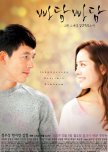
A shining little diamond! An extraordinary masterpiece that touches the heart in more than one way!
For all those who like three-dimensional life in movies and television. For all those who, apart from the clichés, are open to more complex relationships and personal development processes. For all those who want to get involved with a downright hopeless fate at the 'lower' end of the social pyramid. In this context, one should not allow oneself to be driven away immediately by punches and kicking. "Padam Padam... the sound of his heartbeat and hers" rewards with a touching love story that, by Korean standards, takes its place in an almost sensual, sensitive way.I already got to know Jung Woo-sung in "A Moment to Remember" as an exceptional actor, enriching his encounters and relationships with an almost sensual dimension. That alone is a unique feature that contributes enormously to the quality of this KDrama.
Nevertheless, it wouldn't do justice to the story (which is wonderfully told in all instances) to reduce it to just a romance. It tells the story of an ex-con and his fellow inmate. It quickly becomes clear that Yang Kang-chil actually was innocent. And even after his release 13 years later, he is not free from that momentous act that he did not commit. Rather the real perpetrator would like to finally get rid of him for good, as he had witnessed what really happened back then. And others, too, have not forgotten or even forgiven what happened back then.
Kang-chil, on the other hand, would like to make amends for the lifetime that was unjustly stolen from him in prison. He's a simple, uneducated young man, now in his 30s, who only learned crafts in prison. His vita has taught him to engage 100 percent in the NOW. He may seem simple, yet he sees life in simple terms. However, he is quite capable of comprehending, of taking action and responsibility as well. He choses a simple, direct route. If he is happy about something today, then he gives room for this joy TODAY. Not tomorrow. And he doesn't have to weigh up whether it's ok to be happy or not. It's the same with anger. In short: he follows his heart. And there we are with the title of the KDrama: "Padam Padam". As onomatopoeia, it refers to the heartbeat (and takes up the title of a chanson by Edith Piaf of the same name).
------ SIDE NOTE --- Importance of onomatopoeia in the Korean language ---
The title "Padam Padam" also refers to the fact that the so-called onomatopoeia/onomatopoeia is of particular importance in the use of the Korean language - it is about eight times as important as in other languages. In Korean, remarkably often in narratives one can encounter the simple (yet acoustically imitated in a culture-specific way) onomatopoeic imitation of simple natural sounds. The list of everyday onomatopoeic vocabulary is correspondingly long. With this content communication is expressed more directly, more forcefully, more concretely and more immediately. "Padam Padam" therefore not only refers to the heartbeat - symbolic of the life that one wins and loses again, or for the feelings of the two lovers - but also to the special portion of 'directly conveyed, sensually experienceable feelings', which the protagonist places in all of his encounters.
A lot of heart and soul goes into the hand-picked production design, which also mostly wants to leave a consciously direct impression for all senses. (Mainly we are in the rural areas of the coastal region of South Korea.) The landscape, the sunset, the lake at night, the fireworks, etc. impress through a high degree of aestheticization. Sometimes you have the impression that you can literally smell the sweat of the well-trained young men... At other times some scenes are repulsive, ruthless, almost ugly - yet still highly sensual.
So Kang-chil is sensitive, but he's also a tough guy. He's not your usual appealing protagonist. He is peculiar, impetuous, impulsive, irritating, and also disconcerting. But he quickly grows on you in his sincere, direct and sensual way. This is actor Jung Woo-sung at his finest. His female film partner Han Ji-min can't resist the intensity that emanates from him either. It's a pleasure to watch her being drawn into his spell. (Here I can expressly praise the chemistry between the actors...) And then there is Na Moon-hee, who once again embodies the bumpy, complex and yet emotionally real (South Korean) mother-son relationship in a three-dimensional authentic way. By the way, the men here are above all punching, kicking and spitting as if it were the most natural thing in the world. That may be due to the milieu in which the story is set, but not only. Even if it seems strange to the Western eye at times, the KDrama is authentically filled with life throughout.
The story finally offers a not inconsiderable special feature as an encore for its surprising developments away from your ordinary everyday life: a guardian angel (wonderful: Kim Bum with ponytail) .
An extraordinary masterpiece that touches the heart in more than one ways!

A bit weird and edgy, yet refreshingly and unashamedly honest about what love life also is like
"LTNS" (Long Time No Sex) starts off where other series usually end. TVING doesn't care about age ratings. “LTNS” is unusually explicit for a KDrama. At the same time, “LTNS” presents itself as a pitch-black comedy with venomously satirical overtones. Be prepared for an edgy series that is refreshingly and unashamedly honest about what love life also is like...If desire in a relationship has been turned off over time by habit and everyday worries while instead alienation and disinterest are creeping in... what should you do? The protagonists unexpectedly find an almost absurd option to bring some excitement and “we”-time back into their relationship. With detective zeal, they set out to blackmail those in whom the fire of (actually forbidden) desire still burns happily... and in doing so, they thus try to create a (almost criminal) virtue out of their own need, so to speak.
"LTNS" has fun with scenes that convey uninhibited sexuality one moment, but are completely unerotically thwarted the next. It is somehow down to earth in a most peculiar way. Bedroom stories are being told here that we haven´t been waiting for. All of a sudden such a certain mood for certain hours is eventually collapsing like a house of cards due to a mishap or unexpected incident... A "Bravo!" in this context to the actors, too!
“LTNS” promises a special kind of bizarre, weird series delight with plenty of potshots at the mendacity concerning certain facades of a solid and sincere love life and family life that are usually and preferably presented to the outside world.
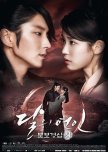
Entertaining, yet rather lightweight. Visually stunning scenes. Emotionally intense at times, too
Frankly, I'm not a fan of shallow, adolescent love stories. (Not necessarily because they are not good, but I guess I am too old by now. The topics are not mine anymore.) I'm interested in somewhat more complex, mature characters and differentiated relationship studies - preferably in an distinctive (Korean) context with additional historical, cultural or subcultural insight."Moon Lovers - Scarlet Heart Ryeo" originally goes back to a Chinese story. The movie adaptation was a great success and so here comes a Korean remake - the plot is unceremoniously moved to the Goryeo of the 12th century and a controversial historical ruler is portrayed on that occasion: the 4th son of the founder of the Wang dynasty (who ruled the Goryeo Empire for over 400 years) King Gwangjong, born under the name Wang So (925-975).
----------------------- SIDE NOTE --- King Gwangjong
Some historical sources have led to the interpretation that he was a right-wing tyrant, but more recent evidence suggests that he implemented the major reforms that laid the foundation for a solid kingdom for more than 4 centuries. This character has also appeared several times in KDrama, for example in "Taejo Wanggun" (2000), "The Dawn of the Empire" (2002), "Empress Chunchu" (2009), "Shine or Go Crazy" (2015) or here: "Moon Lovers - Scarlet Heart Ryeo" (2016).
Wang So had three older brothers (Wang Mu, Wang Tae, Wang Yo), 20 half brothers and 7 half sisters. From this, one can firstly see that he was not actually considered for the line of succession, and secondly suspect that King Taejo kept several wives at court. As life goes, all three older brothers died for different reasons and in the end the crown accidentally fell at Wang So's feet.
After a turbulent period of 3 kings in quick succession, King Gwangjong re-established a stable, centralized government with a strong, loyal army and 7 peaceful years before the aristocracy rebelled against his reforms (which came at their expense). One of his innovative reforms concerned slave ownership, which he had officially checked for legality. When in doubt, the slaves became free people and taxpayers (while their former masters began to lose influence...) However, putting down this rebellion of aristocracy earned him the reputation of a bloody tyrant.
Another reform was the introduction of a national civil service examination, which lasted for almost 950 years. This replaced the pure nepotism previously practiced in filling political offices with performance and ability. At the same time he laid the basis for Confucianism as a principle of social order. He also introduced a dress code at court, from which the respective rank could be read from the colors.
King Gwangjong married his half-sister and two nieces. This is unique in Goryeo's history, as it was more common at court to marry outside of the bloodline in order to gain allied lordships. Gwangjong, on the other hand, relied on a strong, purely royal bloodline. After all, he ruled for 26 years and set the course for the next 400 or so.
-----------------------------------------------------
Back to the KDrama. Unfortunately, the plot that was spun around this dazzling historical king and his family is a bit shallow and predictable at times. Sometimes it reminded me of a harmless, colorful teenage boarding school flirtation. (I obviously don't quite correspond to the target age group there...) But then, furthermore, the story offers unexpected depth and emotionally touching scenes, too. After all, it also comes along with some exciting and visually stunning sequences and an atmospheric soundtrack. I initially ended up there for ´actress´ IU in the first place. In fact, I discovered Lee Joon-gi (as Wang So) in this KDrama. In my eyes it is his down-to-earth charisma (and maturity?) that helps to overcome some weaknesses in the script.
An attractive dramaturgically dynamic component is the leap in time, through which the approximately 20-year-old Go Ha-jin (IU) suddenly ends up at the court of the royal Wang family - in the midst of the numerous sons and half-sons of King Teajo... As a woman from the future, she brings fresh air and a cheeky spirit into everyday palace life, which is characterized by distrust and intrigues. The various mothers are prepared to do almost anything in order to secure a royal career for their precious princes. At the same time, the modern Ha-jin in her idiosyncratic way brings the blue blood of the king's sons (some of whom are still quite pubescent) to a boil, thus providing additional competition among the boys on top of the already existing succession rivals ....
A nice, charming, entertaining, but rather lightweight KDrama-tour into Korean history.
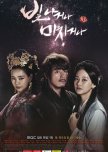
About prince Wang So of Goryeo. A love story with wit, charm & affection. Makjang alert. Toxic, too
First of all: "Shine or Go Crazy" is a love story from head to toe with all the trimmings. Nevertheless, it is also about the dazzling historical figure of Wang So - King Gwangjong from the early hours of the Goryeo era. Thus it is a beautiful character study about the young prince, who at last became king, but who had by far not been the preferred prince of choice as far as the future throne was concerned. How did HE happen to become not only king but such an outstanding one as well - one who is NOT automatically (as so often) a jumping jack for his ministers, eunuchs and palace ladies? Who or what motivated and inspired his rather grounded, almost visionary, innovative, citizen-oriented policies?This KDrama offers a (possible) answer to history, as well as an epic love story, playfully sprinkling disguise of origin and confusion of gender.
----------------- SIDE NOTE: --- Wang So, 4th son of Goryeo King Wang Geon, and later King Gwangjong
During his 26-year reign at the end of the first millennium, King Gwangjong laid solid foundations for the next four centuries. To this end, he introduced some popular reforms for the common people (yet unpopular among the nobility). Above all, these concerned slavery. Additionally he instituted the national civil service exam, which allowed people to serve the country according to their ability. Introduced during his reign, too, were so-called "Daebi-won" - medical centers for the free care of the poor. Finally, he secured the borders of the empire with military measures. Throughout, he consistently had to deal with opponing noblemen ... and eliminated them uncompromisingly. "Shine or Go Crazy" is a dignified multimedia monument to his rulership, that in general rather focused on the needs of his ordinary citizens than aristocracy.
The KDrama "Shine or Go Crazy" (as well as "Moon Lovers" who deals with King Gwangjong, too), offers a conclusive explanation for this King´s particular career. Whether this is historically justified by sources, I could not find out yet. In any case, Prince Wang So becomes tangible and understandable with the help of this fictional setting: The KDramas tell his story as at a young age being banished from the palace and sent to the mountains - thus hopefully avoiding a bloody prophesy from coming true. There he lived a life beyond the palace intrigues, yet close to nature and its existential everyday struggles for survival. Like that, his everyday life inevitably came quite a bit closer to that of the ordinary people of his time. This socialization in 'freedom' and largely grounded normality shaped him in a completely different way than his (numerous) direct and indirect siblings within the palace walls and thus makes him a resolute and popular monarchical free spirit. At the same time, this lays the right foundation for placing a completely unorthodox, unexpected and inspiring commoner´s love at his emotional side. Like that the fictional K-Drama helps to on the one hand understand the sharp edges of his disappointment because of parental rejection as well as his self-doubt due to his curse. On the other hand, however, this is balanced by down-to-earth experience of authentic affection and love. Historically true or not, the extrordinary historic personality of prince Wang So is painted in an impressively tangible, comprehensible way.
------------------- SIDE NOTE --- Trading at the time ---
An aspect of historical detail that's (in general rarely) brought into focus in "Shine or Go Crazy", too, is the importance of thriving international trade at the end of the first millennium. Throughout Korean history, life on the peninsula (not only, but also in KDrama) is rather isolated and self-centered. In this story, at least, business relationships with the immediate neighbors and with the rest of the world are given some space, at least to some extent.
-------------------- SIDE NOTE --- Balhae / Late Balhae
Also rarely a topic in the focus of KDrama is the Korean history BEFORE Goryeo - the time of the three kingdoms Silla, Goguryeo and Baekje. In "Shine or Go Crazy," the female protagonist is a princess from the Late Balhae Kingdom in what is now Manchuria. This dates back to one of five kingdoms that in 37 BC united to form the kingdom of Goguryeo. The first Goryeo King Wang Geon (posthumously Taejo) at his time attempted to reconquer the former territories of the original Goguryeo Empire and thus set his kingdom on proven, solid ground. Balhae being one of them, had previously fallen victim to the Para-Mongolian Kitan. Some (many) Koreans from ancient Goguryeo, who formed the ruling Balhaen elite, escaped to Goryeo - with the crown prince, the nobles and parts of the population. The female lead is set in this context (and also personally associated with an alarming (fictitious) prophecy regarding the future of her people.)
------------------------------------------------------------------------------------------------------------------
Back to the (love) story between the 4th son of Goryeo King Wang Geon and the Balhaean princess, who is an independent prosperous business woman.
In proven KDrama style, there are subplots with their own stories and characters with their own motives, who courageously get involved in the (love) life of Prince Wang So. The political stage is intransigently characterized by malevolent power intrigues. There aren´t any scruples anywhere. Upright people hardly exist, loyalty and dependence being mixed up and confused. There's a lot of bad stuff going on everywhere. It gets pretty ´toxic´, too.
Set in this context is the affectionately and also humourously told relationship of young prince Wang So with a smart, proficient, quite self-confident lady in a double role in disguise as young man. These encounters inspire and enhance Wang So´s pragmatic world view. The dynamic between them is fun to watch - with wit and charm, since his queen of hearts is sometimes hidden behind a veil and sometimes in men's clothes. At times, Wang So has to seriously doubt his gender orientation (... not that this would have deterred him...).
Ah. Yes. The ending... Reviews I had read often blamed the ending. I was ready for the worst. Probably that was a good thing. Like that I was pleasantly surprised as I had expected even worse. In fact, whether I liked it or not, the ending made quite a lot of sense to me. (After all, this is about a historical character - the prince becomes king and has an archetypal task that is greater than himself - during his reign, Gwangjong sets the course for future generations.) Nevertheless, KDrama land even got us a little candy at the very end, too.
My criticism, however, refers to the soundtrack! Unfortunately, this is the first time I definitely have to complain! Shallow songs can have their time, I don´t mind. But in this case (at least in my acustic sound system) as soon as romantic vibes gently started to develop, an inappropriately dull, meaningless song (in my perception) acustically dominated the scene and thus insensitively destroyed each and every moment (again and again). A real shame! (I would like to hope, that this was just due to my technical device...)
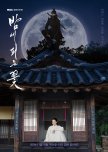
Cheeky, cheerful and heartfelt, drops of suspense included
“Knight Flower” is set in Joseon days, yet it is no epic, historical KDrama in a classical sense. It has endearing comedy to offer, the touch of a romance and even a touch of crime thriller, while the setting back then in Joseon is accounted for predominant neo-Cunfucian social ethics in those days. In particular, back then being widowed was bad news for women, whatsoever. (See side note). This circumstance is providing the hook for a cheeky and fresh-minded KDrama plot.In "Knight Flower", the widow simply cannot get herself to merely spending the rest of her long life in honorable, virtuous seclusion, mostly invisible to the rest of the world, trying not to be too much of a burden to her in-laws, and otherwise mourning the deceased husband (whom she never actually met) in the afterlife.
No, this widow does her own thing. She is not interested in being reduced to the virtue of mourning. During daytime, her everyday life is that of a honorable widow and decent daughter-in-law. Yet, at night she is dressed in black, wearing pants and a mask, climbing over walls, jumping over roofs and helping the poor – as "Midam", a kind of Robin Hood of Joseon. Such is her double life. All goes well, until one day...
While the plot is drawing its dynamic appeal from the actually rather sad background of a dubious tradition of treating widows (not only practiced in old Joseon, and not only back then…), the good news is: "Knight Flower", as a production broadcast in 2024, is built on intelligent emancipation, too. What is called for is not compliant bowing, but rather self-confident, creative solutions in dealing with life. Obviously South Koreans are craving for such a role model these days. The show was quite a success. People there apparently enjoyed it. So did I.
"Knight Flower" is cheeky, cheerful, and heartfelt, drops of suspense included, thus with alluring wit offering an enjoyably entertaining genre-mix.
------------------------------------------------------------
SIDE NOTE: --- Yeolnyeo or Yeolbu, the virtuous woman of Joseon ---
A loyal subject can only serve ONE king and a virtuous woman can only serve ONE husband. This perhaps briefly summarizes the core of the moral teachings of the period between the 14th century and the beginning of the 20th century. Practically speaking, this implied a widowed woman could face death penalty, if she ever wanted to marry again.
Women had to be obedient to their parents and in-laws. They had to honor their husband. And after his death the eldest son had the say... The greatest asset of a woman, besides bearing children, was her virtue. And that was eventually all that was left, if her husband might have died before herself. There was even granted an official award for valuing outstandingly honorable virtuous widows with the reputation of being a Yeolnyeo or Yeolbu. Thus they had to be particularly determined with living as a commendable model wife even after their husband´s death – according to all the rules regarding morals and daily routines as set out in detail in the book about good conduct for virtuous women…
However, the pressure on widows to be respected as Yeolnyeo became excessive over time. At some point it was even common for widows to consequently take their own lives, too, thus expressing their praiseworthy being loyal to the husband until the bitter end. In this way, they could posthumously provide their family (or that of their deceased husband) an honorable glory of virtue in which all family members could bask. Eventually, suicide was even expected of a widow – especially if she became a widow at a young age...

An extraordinary mixture - a fresh, fast-paced breeze, yet profound and multidimensional
"Military Prosecutor Doberman" brings a fresh, fast-paced breeze into the swamp of army power tussle and its entanglements with politics and business. The power tussle in this context is not new per se. But here it is convincing in proven, sophisticated, high-quality KDrama style. The story is critically focusing on the ruthless games of the mighty with honest ordinary people. By the way it is also shaking the noble, idealized concept of family -just a bit in passing by. Yet above all "Military Prosecutor Doberman" is impressively processing, disenchanting and denouncing the often (even without actual front war!) psychologically cruel everyday army life.As I mentioned before, the pace is quite high. There is cool talk and hip people. You´ll get action scenes as well. The soundtrack underlines the story pace with unusual hard beats and metallic sounds. But: nevertheless the KDrama wants to be emotionally profound and multidimensional. In case you consider that an imcompatible mixture, you're wrong. Here it works. And it's excitingly thrilling too.
"Military Prosecutor Doberman" creates an extraordinary blending. There is also a hint of romantic vibes. Just enough to round out the hard edges.

A pleasantly beneficial KMovie infusion. Quiet. Tender. Full of consolation & healing impulse
"One Day" is a beautiful KMovie. Quiet. Tender. Full of consolation and healing impulse. In addition, the story expands the usual dimensions of perception - human being sees ghost; man builds relationship with ghost. The extraordinary situation facilitates extraordinary closeness, opens up new perspectives and allows the male protagonist to look behind the obvious.The female lead character is visually impaired in life, yet specialized in sensing touch instead. The male protagonist, on the other hand, finds himself in a stage of his life, where he prefers to avoid his feelings, because they might overwhelm him. His inability to face the grief over his deceased wife, his feelings of guilt and being lost completely block him. By the way, the female protagonist is also blocked: she is in a coma.
The process of rapprochement between the two triggers a healing process, which is captured tenderly and lovingly, reaching out to the side plots, too. The KMovie knows how to touch. It might come along in an unexcited manner, yet with the perseverance of water, dealing with the stone...
After seeing the movie for the first time, I had no idea what had happened to me. It had pulled me into gentle inebriety. I had actually been sucked in and completely lost the distance.
So I couldn't write anything about it at first. I knew, l would rather want to see it again sometime in the near future. And again, it might not have been my last encounter with “One Day”. Why? Because of the overall gentle tone, the particular radiance, and the unique look&feel of this story. Because it's good.
“One Day” is not a blockbuster, no. However, in my eyes and according to my feeling, it offers a pleasantly beneficial KMovie infusion. (With wonderful acting, too.)
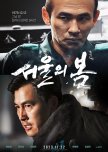
Cinema at its most, when it comes to political thrillers
Among the South Korean cinema audience in 2023/24 "12.12: The Day" sure was a great success. Production costs were thus recouped after 12 days already. Even beyond the national border the movie is considered among the bests South Korean films of 2023.The story takes place in a world of uniformed men where stars and suits call the shots. There is talking, negotiating, and telephoning. There is also shooting, but comparatively little. The action is limited, even as various military units are actually invading Seoul to reinforce Chun Doo-hwan's security forces. However, it is cinema at its most, when it comes to political thrillers. "12.12: The Day" is compellingly captivating and knows how to stir emotions.
It wasn't long ago that the military in South Korea was thus actively involved in politics. Yet, Chun Doo-hwan's military revolt in that particular December night is a chapter that has long been given comparatively little attention. This KMovie now contributes to making these decisive events of the time conscious and helps to not having it forgotten. (Perhaps the right film at the right time... without knowing sort of preparing the public opinion for another momentous December night yet to come at the end of the year 2024…)
In any case, the right actors were in front of the camera – the KMovie is consistently high-caliber and lives from the strikingly concise character portraits. The names of the true historical figures were minimally altered to allow for more dramatic freedom. (It certainly helps as a non-Korean audience to know a bit about the political and historical context. However, the dynamics are outrageous even without this knowledge...)
The film offers an exceptionally candid portrayal of a crucial momentum in South Korea's recent history. Despite its politically and historically almost documentary-like dramaturgy, the KMovie manages to stir the emotions of the South Korean public today. Especially among the younger audience, it quickly became common to post a screenshot of their heart rate captured by their smartwatches on social media during the 141 minutes of the film to document their outraged indignation.
Even though "12.12: The Day" sometimes seems documentary, it is not a documentary film. The KMovie understands itself as historically precise. Yet, at the same time equipped with dramaturgically pointed degrees of freedom it allows itself to further increase the emotional density, too, and thus amplify the intensity of those impactful hours of that particular night.
By the way, the original title "Seoul Spring" subtly refers to the "Prague Spring," in which eventually hopes for democratization were also abruptly dashed by military force – however, in another country and ten years earlier.
-------------------- HISTORIC SIDE NOTE -----------------------
The era of Park Chung-hee's military dictatorship abruptly ended with his assassination on October 26, 1979. Meanwhile, any high hopes for democracy were quickly dashed by security commander Chun Doo-hwan amid the ensuing turbulences and power vacuum. Together with the so called Hanahoe connection, consisting of his classmates from military academy, Chun Doo-hwan promptly and forcefully seized his opportunity: Having the military intervening in politics again… Thus, the hope for true democracy after Park's death was brutally dashed on December 12, 1979, as the new dictator was already waiting in the wings. The KMovie mainly revolves around those 9 decisive hours: how Chun Doo-hwan managed to win over, persuade, or push key people to side with him and carry out a military coup with a momentous impact for the nation.
In April 1980, he became head of the KCIA (Korean Central Intelligence Agency). In May 1980, he declared martial law. He is responsible for the Gwangju massacre, for the suffering of people in various cleansing camps, and for the torture chambers of the KCIA. On September 1, 1980, Chun Do-hwan officially took office as president and remained a rigorous dictator for 8 years.
It is truly sad, almost outrageous, that in the end, during that decisive night in December 1979 only the commander of the capital guard and a vague 100 of his people dared to really oppose the revolting military commanders around Chun Doo-hwan. Thus, not only the masterminds of the military coup and their Hanahoe comrades are to blame for the coup's success. Unfortunately, many more for various reasons quickly became opportunistic or switched sides out of fear. For 9 hours, a bitter power struggle raged behind closed doors of different operations centers in the middle of the capital Seoul. And on the streets of their own country the military pointed their weapons at each other… (…again).
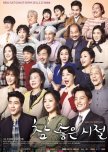
If you´re only in it for the romance, than skip that one. This KDrama is actually so much more.
This is a family saga in cross-section. Typically, the list of the main actors only contains Lee Seo-jin, Kim Hee-sun and Ok Taecyeon. However, I think the whole family belongs here because family is the issue. Of course there is a romance (and not just one). However, sooner or later is always about family. And so "Wonderful Days" is the perfect KDrama to study family structures, dynamics and values as well as its impact on every day life in South Korean culture and tradition.Family hierarchies, manners, customs and traditions are presented in detail. The setting for this is fittingly the traditional hanok, in this case a giwajib, a dwelling for a middle-class family. In "Wonderful Days" you experience family as it would like to be and family as it really is, behind the facade - with all its taboos and lies and secrets and flaws. The issues of disability, adultery and flaws of single parents are dealt with. The questions of who is allowed to marry whom and what that means for family life are worked through. Finally, it is also about pride, guilt, shame, reconciliation, forgiveness and emancipation.
I think actress Youn Yuh-jung rocks the entire show. The processes she goes through again and again are numerous and moving. In some places, where she seems very traditional and her decisions seem virtuous in the service of the family, she also turns out to be truly modern. She always makes up for her lack of education with a lot of heart and common sense. She is already a strong mother model. But at the same time she shows herself vulnerable and conveys very vividly that this mother role demanded by society is practically superhumanly difficult and actually impossible to achieve.
With the action location of Gyeongju, you also get a tiny glimpse of the historic Silla city in south-east South Korea. The grave-mounds of the Silla Kings provide a scenic background more than once. The specific, comparatively melodic Busan dialect that is spoken in this region is also acoustically striking in the dialogues.
This family drama, in which everyone works through their own inner and outer struggles within themselves and the family, is told in a compassionate, vivid and multi-layered manner along numerous storylines through the entire family. Accordingly, this 50-episode KDrama has more episodes than usual. You can indeed learn to understand how the individual in South Korea holds back for the family, or what strength one has to muster in order to protect one's self-interest against the (supposed) well-being of the family, especially the elderly. Self-sacrifice and the ability to suffer are a given - as if it were the most natural thing in the world. However, they are sometimes subtly and sometimes openly questioned. The quarrel is conducted within the drama-family, but inevitably continues in OUR heads, hearts and personal worlds, too. Thus, it is a sensitive socio-critcal study and a sophisticated scenario, for confronting South Korean audience with traditional values facing modern life in 2014. Perhaps it is also interesting to know for non-Koreans (in order to understand some other dynamic of the story): adultery has only been unpunished in South Korea since 2015, abortion since 2017. Before that, it was a crime.
Sometimes the family dynamics are almost unbearable from a western point of view. They may also seem exaggerated as far as our (I am here refering to ´my´ western, german) reality is concerned. The decisions of the protagonists sometimes seem to be incomprehensible. But then again - as far as South Korea is concerned - this is not exaggerated at all. These dynamics are real (but in good makjang fashion, they also add a bit more drama for good catharsis effect). In any case, for Western viewers those dynamics are instructive for studying the culture-specific value systems and, last but not least: occasionally also thought-provoking, too.
Ah. Don´t let me forget to mention... it is about a love story, too. Not only one actually. But if you´re in it for only this romance, than skip that one. You will be busy fast-forwarding most of the time - because this KDrama is actually so much more...

Psychological thriller re. gaslighting & family, wonderfully wrapped in the cloak of a black comedy
Psychological thriller meets black comedy. “Bittersweet Hell” is wonderfully staged in many ways. The script may have its weaknesses here and there, but the performance as a whole quickly makes you forget about that. Lee Hye-young clearly steals the show from Kim Hee-sun here. However, it's hard to top her fantastic performance as the eccentric mother-in-law (which alone might make a rewatch worthwhile...). Together they form a resolved mother-mission-duo, both determined to fight the 'WE' of their family, in which they feel deeply at home… even if this 'WE' might have plenty of flaws... Eventually, the cast is also hand-picked in other ways, e.g. with KPop Idols Yeonwoo, Jaechan and Chansung. Overall, I´d say “Bittersweet Hell” offers unique KDrama enjoyment.The plot is centered around the psychological phenomenon of so-called 'invalidating communication', which is also known as 'gaslighting' – after the play "Gas Light", which became particularly famous in the 1944 film adaptation "The House of Lady Alquist" with Ingrid Bergman. Gaslighting is about deliberately and consistently misleading a partner, family member or close friend. Gaslighting only works among close ones, i.e. trustworthy people. Thus manipulated with psychological tricks and lies, the victims feel increasingly insecure when it comes to their own perception, ultimately preferring to entirely rely on the supposedly valid judgment of their trusted person… who is now able, to fully control his/her victim. In "Bittersweet Hell" various examples of this phenomenon add to the plot dynamics. In passing, the KDrama also explores other socially explosive topics – above all the high value and ideal of ´family´ versus the sobering reality of ´actual family lives´, but also the weal and woe of the mother's role, different parenting styles and sexual orientation.
In my opinion, "Bittersweet Hell" could have used the 16 episodes (there are only 12) in order to better develop some character profiles. The effective production and performance, however, is actually very well making up for some lack of substance here and there. Therefore I´d consider this criticism a suffering on a rather high level… because nevertheless, “Bittersweet Hell” comes along as a great psychological thriller about gaslighting and family, wonderfully wrapped in the cloak of a black comedy.
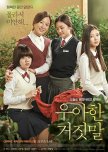
Fantastic, the (red) thread - in every respect.
I have been reading only positive critiques about “Thread of Lies” all over the place. It just took a while before I could see the KMovie for myself. Basically, all the praise has already been said. Nonetheless! The story, which is sad in itself, is told, staged and acted in just such a wonderfully clever way! Despite the seriousness of its topic, the basic attitude is positive and light. The complex and complicated underlying social and emotional mechanisms are so sensitively identified and processed, I can't help but find words of praise for "Thread of Lies" myself, too! Absolutely worth seeing! The characters, their motives and backgrounds, their conflicting feelings, the gray in the shadow, the light in the darkness, everything comes across as multidimensional authenticity.The older sister sets out to find out the actual reasons for the suicide of her younger, 14-year-old sister. We with her. There are traces – Suspicion. Culprit. Fault. Shame. As far as the eye can see... ...including the look in the mirror. Yet, it is not the index finger being raised. Rather, there is a hand, valiantly reaching out. Powerful!
It is not about accusation and blame or justification and defense. It is like it is. It was what it was. Recognizing THAT for what it is. Not sugarcoating it. No excuses. Recognizing each individual’s own contribution to some tragedy. It's all about this. To learn something out of it? In the best case!
In this KDrama, bullying (or mobbing) comes without bloody beatings and physical violence. Rather, it is the psychological, manipulative, nastily hidden, difficult-to-understand social-emotional mechanisms that are elaborated in an extremely sensitive, comprehensible way. A girl is forced into inner isolation at an age when the peer group actually becomes more important than family. Friendship, dependence, abuse - the boundaries are not yet so clear. When it comes to that, the young are still 'children' – perhaps with high ideals already, but still without lived friendship-experience. Friendship is a word with deep meaning, a powerful concept. It is related to high hopes and yearnings. It is needed, in order to survive in this world.
In contrast, there are parents who know better and still duck away. There are bullying victims who somehow survived. Also parents, who are absorbed in their own world. And in the middle of it all, a young girl says goodbye to this world. Decided and definite. Yet at the same time hesitant, too. Desperate after all. Helpless. A 14-year-old says goodbye to a world in which the only one, who knew about how she truly felt, was a stranger...
The complex story is processed in a non-linear manner. Compact and yet differentiated. The tragedy of the unspectacular is intensified by a rather subtly developed arc suspension. Touching, but not told in an overly emotional way. And what can I say... the story unfolds in such a true to life manner that you can't even be angry with the venomous perpetrator. At least not as much as you would like...
Fantastic, the (red) thread - in every respect.
PS:
The story is based on the novel “Elegant Lies” by Kim Ryeo-ryeong in 2009. Actually, the film production had a rather low budget and its initial difficulties to get started, as the topic is considered highly sensitive, especially in South Korea. The KMovie, however, gave the lie to the doubters. The response was enormous and consistently positive.


 9
9 41
41 15
15

















